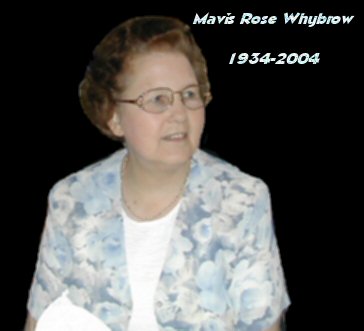 click thumbnails to enlarge
click thumbnails to enlargeMavis Whybrow
 click thumbnails to enlarge
click thumbnails to enlarge
I, Mavis Rose Sylvester, was born on the 4th September 1934 in Seoul, Korea to Charles and Nellie Sylvester who were pioneer, missionary Salvation Army Officers in Korea. I was the eighth of their children. My father travelled to Korea with Lieutenant Herbert Lord, who later in life became a Commissioner. So dad arrived in Korea on February 5th 1910 and was to serve in that country for nearly thirty years. My mother arrived in Korea in July 1913, mum and dad were in the same training session but they never met there. However their friendship in Korea resulted in their marriage on 15th December 1914.
Of the
eight children, four boys and four girls, their first and third child, both
boys, Gordon aged 4 and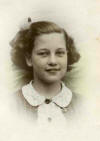 Douglas aged 9 months died of small pox in the early
years of my parents' marriage. My mother and 3 year old Bramwell were also
smitten with small pox at the same time, but they survived. My parents were
blessed with more children so by the time I arrived we numbered six.
Douglas aged 9 months died of small pox in the early
years of my parents' marriage. My mother and 3 year old Bramwell were also
smitten with small pox at the same time, but they survived. My parents were
blessed with more children so by the time I arrived we numbered six.
On December 6th 1935 I, and the rest of the family, arrived in England for a holiday. My Dad and my eldest brother Bramwell travelled immediately into London for a couple of days, as Bram wanted to enter the Salvation Army Training College the following year. Whilst Bramwell and Dad were busy in London, my mum and the rest of us (my other brother and 3 sisters) travelled on to Blackpool to stay near Grandma Harling for about six months leave before we returned to Korea. Bramwell, however, stayed with his Grandma.
By 1937 my Dad was chief secretary of the Salvation Army in Korea (second in command). In 1939 when I was just four and a half years old we had to leave Korea due to difficulties with the Japanese who ruled Korea at that time. Both my father and mother refused to worship at the Japanese Shinto Shrine, so it was felt expedient to leave the country and get the family to safety, before the situation got even worse.
So again
we boarded a ship and on June 6th, 1939 I arrived in Rhodesia (now Zimbabwe)
where my Dad was appointed as chief secretary of the Salvation Army in what was
then called Southern Rhodesia. We lived near the centre of Salisbury, which
was the capital city. This was a lovely place to live in then and with its
flowering trees lining many of the streets, it was so beautiful. It was in
Rhodesia I first started school.
Sometimes my sister Joan and I were able to accompany our parents when they
visited some of the Salvation Army outposts like Howard Institute, which had an
excellent school and a hospital where they not only treated patients, but also
had a training school for nurses. At that time most of the teachers and nurses
were missionaries. During school holidays we would sometimes stay there for a
few days.
'At one time in Rhodesia I shared a bedroom with my sister May. I was a very serious 'mother' to my dolls. May remembers that I talked to them all day and sometimes in the night. I always insisted that they were not dolls, but my babies. It was obviously good practise for motherhood'.
My parents would usually take Joan and me to places within Rhodesia for our holidays, mostly Inyanga which was in the hills, not far from Salisbury, but we also went at least once to Beira in Mozambique on the East Coast of Africa
The most memorable holiday we had was in Durban, South Africa. As usual just Joan and I were taken by our parents. I guess the others earned enough to pay for their own holidays. The start of the holiday was the most memorable. The journey to Durban had to be taken by train which took two or three days. As a holiday to the coast in South Africa was always something very special in those days, many people came to the station to wave us off.
It was only after the train started moving and we had stopped waving to our friends that we sat down comfortably in our seats then a moment later my father got up from his seat to count the cases, suddenly we realised by the look on his face that something was very wrong. One large case had been left in the boot of the car that brought us to the station. It had nearly all the clothes for Joan and me. My Dad looked as if he was going to pass out. Oh dear, this was right out of character for my Dad. He was always so organised.
Fortunately Joan and I both had in our little cases enough clothes for the journey, but not enough for a 3 to 4 week holiday staying in a hotel. I think that when we arrived at the next large station he got out and made a quick phone call requesting that the clothes were put into parcels and sent on to us. It wasn't easy in that first week. My mother did buy a few new clothes so that we looked a bit respectable at dinner in the hotel which was on the sea front in Durban. Many of the clothes left behind had just been made by a dressmaker for us. We certainly felt much better when they arrived. We loved our times of holiday together.
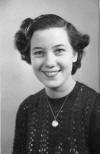 It was
not too long before we were down in Durban again. This was in 1944 when my
parents were appointed to the Southern India Territory where again my father
would be Chief Secretary. The person who had been in that appointment was
unwell and needed to move to a cooler place.
It was
not too long before we were down in Durban again. This was in 1944 when my
parents were appointed to the Southern India Territory where again my father
would be Chief Secretary. The person who had been in that appointment was
unwell and needed to move to a cooler place.
The only thing that made us realise there was a war on whilst we were in Rhodesia was the number of Royal Air Force personnel around, many of whom were learning to fly planes there. Also my father would be glued to the radio when the news came through from London.
Down in Durban this time we were far more aware of the war. We were going to India on a ship we did not know the name of, neither did we know the date we would be boarding the ship, because of security reasons. To enforce a 'black-out' because of possible enemy attack, the ships that were in dock had their port holes closed at night. If you were near enough you may have been able to see very dim spots of light during the night. Every day my father had to keep in touch with the shipping company. Then one day we were told we could board a ship (its name I cannot remember) and we noted we were going to sail in convoy to India.
We sailed up to Mombasa and stayed a few days before crossing to India. At the time my brother Bramwell was serving as a Salvation Army Officer in Nairobi. Because of the war it had been many years since we had seen him. My father was overcome with a desperate desire to meet him. He asked if he had enough time to travel to Nairobi to just spend a few hours with him, but they could not give him any definite assurance that the ship would still be there on his return, so he had to give up this wonderful idea. We continued on to India and disembarked in Bombay.
After a day or two there we made our way by train to Trivandrum at the extreme southern tip of India. There we were met and taken to a simple house which was to be our home. It looked the same as most bungalows from the outside, but the floors were made of cement. Mosquito netting was on all the windows and we slept with mosquito netting over our beds. The kitchen was outside at the back of the house and I really don't know what was inside it as we had 'inherited' an Indian cook when we first went there who seemed to want to keep us out of his domain. Would you believe it we were almost just across the road from the Maharajah's palace.
Dad was installed as the Chief Secretary of The Salvation Army in South India. The first few weeks we went around from one Salvation Army corps or centre to another whilst my parents were being welcomed. The South was a beautiful part of India and the people were lovely. At most of the places we visited some young man or boy would climb up to the top of a palm tree and throw down a coconut or two so we could have a pure, refreshing drink. Mum and Dad were given Indian names. Dad's name meant 'son of the King' and Mum's name, 'daughter of the King'.
During that time Joan and I were also getting ready to go school situated in the Nilgiri Hills. The first thing was to get our uniforms made and get together all that we needed for the ten and a half to eleven months each year we lived there.
Most European children in India went to one boarding school or another away from the heat of the plains. Joan and I went to Hebron High School, it was hard during the first few weeks being the new girls, but it was a really excellent Christian school in every way and we soon settled in. While we were there the number of pupils was not high in the senior classes as the boys transferred at the age of 11 years to another school some miles away. We only returned home during the Christmas holiday. Parents usually came up to the hills during the hottest month, July.
There was a Salvation Army Rest Home an hour or two's bus ride and then a walk away from our school called "Windermere" to accommodate officers and their families on holiday, but during the time we were there it was extended and kept open all year round to also accommodate servicemen who were on leave from the front line in Burma.
The end of World War II came in May 1945, but though we had been away from the UK for nine years then and my parents were well overdue to have homeland leave, (or furlough as they called it) there was no way of rushing home. There were many servicemen and others needing to get back to the British Isles. Air travel was not thought of then as a way of travel by most people. So it was not until July 1946 we were able to return home. This was on another ship which also had many servicemen on board. (The teachers at Hebron School were most surprised that we were leaving so soon.)
The ship docked at Liverpool. My sisters Olive (who with her family lived in Scotland) and May, who had only just returned from Salisbury, Rhodesia, were there on the quayside, waving their hands in greeting. It was lovely to see them. It was a roasting hot day, a real heat wave, and the journey back to London on the train was stifling. There we met up with Frank who also returned with May from Rhodesia. He was going to enter The Salvation Army Training College at Denmark Hill, London within the next few weeks.
First we went to stay at "Aucklands" in South London including Frank until he went to the training college. This was a beautiful mansion with lovely grounds left to the Salvation Army and for quite a number of years was used for missionary officers and their families when they came home on leave. May was staying with relatives of Jack Horwood.
As it was just after the war we seemed to need coupons for everything. Getting winter clothes was a priority.
About the time Frank had gone into training a flat for the family became available in Richmond. The corps was very small and they had no corps officer. We used to travel by bus to the Salvation Army at Twickenham as my parents wanted us to see what a good Salvation Army corps was like. I guess this was due to the fact that we went to a Union Church whilst in boarding school in India.
May also came to live with us in Richmond although the flat was tiny. Joan and I slept in a three-quarter sized bed and May in a single bed all in a very small room. It was crowded and I didn't like having to share a bed. There was no electricity at all, we even had gas lights! We had never lived in such a small, old fashioned house in our lives. Every Friday Frank, in his generous Rhodesian way, would bring home to our flat cadets from the training college who had nowhere else to go on their free-time.
We went to a school in Richmond up till the Christmas holidays, when we moved to a flat in Bromley. My sister May stayed with friends in Twickenham. She had a very good job and she could get to it easily from there. Our flat was bigger than what we had in Richmond, but there were other problems. Two elderly sisters lived in the place in rooms downstairs. The house was large, but in poor condition and we lived in the upstairs flat. We were going through the coldest winter in years. Snow and ice was everywhere and my parents were blamed for all the burst pipes. We had to go everyday to a next door neighbour and carry back to our flat buckets of water for all our needs. We used to go elsewhere for baths.
In the week coming up to Easter 1947 we moved to Welling, in Kent. We sat on our boxes throughout the weekend and slept on the floor. Within the next few weeks’ furniture arrived.
There was a nice little Salvation Army Corps at Welling, with a lot of young people. Joan could not get into school as she was above the school leaving age so she started work at the Salvation Army Headquarters which was then at Denmark Hill.
Our next move was to Casimir Road, Clapton. At that time it was a clean, pleasant area. We went into a brand new house! The house that was there previously, had been bombed during the war. Joan & I shared a bedroom and there was a spare bedroom, which at one time my sister May used when she served at National Headquarters. Dad and Joan were able to travel to Denmark hill from there by bus. The Clapton Congress Hall was an enormous building which had previously been The Salvation Army Training College, training hundreds of cadets each year including mum and dad. Before that it was an asylum.
The family settled well into the Clapton Congress Hall where they served for a number of years. I became a songster and Joan and I joined the very first timbrel brigade in 1951. Joan left from the Congress Hall to enter the training college as a cadet the same year. Then only Mum, Dad and I were left at home. When Dad retired we went to live at Northumberland Mansions, close to the Congress Hall. We were on the top floor with a direct view to the front door of The Salvation Army's Mothers' Hospital which had such a good reputation.
One of the family's saddest days was the sudden promotion to Glory of Dad at the age of 66 years. The name of Lt. Colonel Charles Sylvester is still revered at the Clapton Congress Hall where in July 1953 his funeral service took place. As I was then the only one left at home, mother and I formed a close relationship and until her own promotion to Glory.
I also taught the young people at Limehouse Corps how to play the timbrels and formed a new timbrel brigade there.
When the Youth Congress occurred a few years later I took part in a very large timbrel display at the Royal Albert Hall, which was the first one on this scale. It was reported that General Eva Burrows was one of the performers as well.
I first worked at The Royal Free Hospital in the Almoners department, but not long after starting work I contracted what is now known as ME and this necessitated a long recovery period. Later on I joined the staff of Eagle Star Insurance, before later joining a firm of solicitors named Constance and Constance. Their major clients were in the shipping business from all round the world and operated out of the Baltic Exchange. I mainly dealt with the purchase of properties for these millionaires.
 I met
Bernard Whybrow early in 1960 and we were married on the 26th
February 1961, Bernard was
I met
Bernard Whybrow early in 1960 and we were married on the 26th
February 1961, Bernard was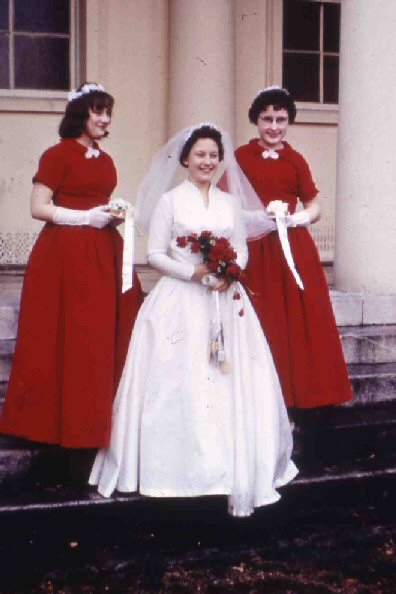 at that time working for The Salvation Army Assurance
Society, but later moved to an electrical contracting company in the east end of
London where he was appointed as the Assistant Company Secretary.
at that time working for The Salvation Army Assurance
Society, but later moved to an electrical contracting company in the east end of
London where he was appointed as the Assistant Company Secretary.
Heather Joy was born at the Salvation Army Mothers Hospital on Sunday 16th August 1964 at 8.20am, and certainly changed our way of life forever.
We were both involved with the Salvation Army Centenary celebrations at The Royal Albert Hall, The Clapton Congress Hall and the Crystal Palace Sports Arena assisting various events and happenings in that very enjoyable time.
Cheryl Ruth was also born at The Mothers Hospital on Wednesday 16th November 1966 at 4.15pm, and then we had to hold on for an even more hectic way of life.
In 1967 three different families made up their minds to move to Shirley Southampton, there were the Whattams’,Wicks’ and Whybrows’, The Three W’s. The hall had seen better days and the New Building Fund stood at £1026.00. All around the old buildings were being cleared away so we knew we had not long to stay in the old hall. The new CO’s soon had us divided into twelve tribes of Israel to raise as much money as possible towards the New Building project, we were in the Napthali tribe and with the help of Bernard Smith our fundraising soon took off. The target figure for all the tribes was the princely sum of £33.000.00, well we all got there in the end.
Once the children were toddlers I started work at The Goodyear Tyre Company in Millbrook, but the typing of invoices every day did not fill me joy. Soon I was working for the NSPCC as a Home Secretary, the Inspectors made their calls and then recorded their reports immediately and sent tapes to me for transcription, it was fascinating, I learned a lot of new words and expressions but as I had signed the Official Secrets Act I could not divulge what these were.
After some considerable time I moved to The Marriage Guidance Council (now Relate) and so had once again a possibility to help people who were going through a tough time. I also worked at various departments within the Southampton General Hospital including the Chest Department and also the Premises Department for a short time.
I the had a most exciting time at The Centre for the Study of Complementary Medicine, meeting clients who were most unwell, some bent over double with pain, but after only a short course of treatment they were walking out upright (just like the days in the Bible I thought.) It was a busy office to be working in but with so much good being done for the patients it made it all worth while.
My final occupation was at Options Alcohol Counselling Service, where I had to learn for the first time how to operate a word processor, and the took very shaky steps in actual counselling of clients after a short training course, this did make me nervous but as it was for the betterment of my fellow man I persevered. I don’t know what the clients thought of me!
Even in my retirement I did not stay at home for long but instead worked in the Corps Charity Shop where I continued to help the needy and enjoy the friendship of those who worked there with me. I did, however, have to give up once my mobility became more restricted.
In my life at the Shirley Corps I have helped in the timbrels especially with the left handers like myself who needed just a little retraining to be in accord with the rest of the group. I was also a Company Guard (Sunday School Teacher) for the Bible class and this I enjoyed very much as the young people responded.
For some time I was the Songster Sergeant looking after the welfare and spiritual life of the Songsters, sometimes visiting with the Band Sergeant (Davis Wicks) on occasions.
My secretarial skills were put to use many times including The Fellowship Club which had a Meteoric rise and fall in just 18 months, but on the whole we had a great time. I also enjoyed Hospital visitation whether it was for our own folk or someone who needed that special word at that moment.
I also enjoyed the Ladies Fellowship group that met monthly, and the various things we got up to.
Letter writing had always been an enjoyment for me and so if I thought that a cheery word or some encouragement could make a difference to someone who was having a tough time then I wrote to them with a prayer on my heart.
On Mothers Day in 1975 the BBC came to do a broadcast from our hall for the Sunday service. I had been asked to do the Children’s Story and I was very nervous. Bernard and I worked long and hard on the story of Nellie, looking at every word to see if we could find any one better. The great day arrived and without any problems on my part the story of Nellie was told. The real subject of the story was my mother which was revealed in the last sentence. A few weeks later we had a visit from Stan and Joyce Cleall who had felt that the message of that service had been just for them, and had called them to the Salvation Army as their place of worship.
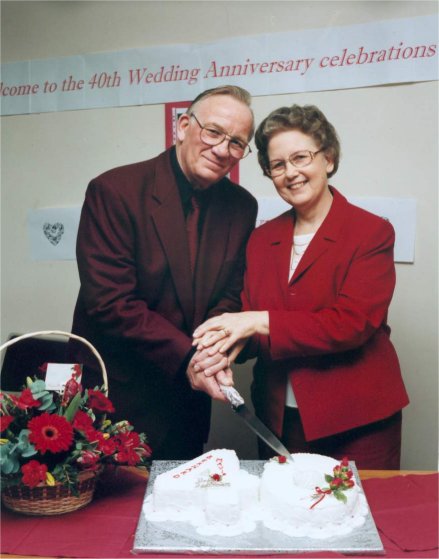 In more
recent years I have enjoyed the arrival of my grandchildren Morgan Owen born in
Portsmouth on 16th July 1991 and Lewis John on 11th
February 1993 both to Heather and Marc. Jasmine Amy was born in Bromley, Kent on
9th August 1995, Bradley Charles at home on 4th December
1998 and Zara Rose on the 9th April 2000 to Cheryl and Tim and most
recently Ieuan Lisle born on 2nd January 2004 also to Heather and
Marc.
In more
recent years I have enjoyed the arrival of my grandchildren Morgan Owen born in
Portsmouth on 16th July 1991 and Lewis John on 11th
February 1993 both to Heather and Marc. Jasmine Amy was born in Bromley, Kent on
9th August 1995, Bradley Charles at home on 4th December
1998 and Zara Rose on the 9th April 2000 to Cheryl and Tim and most
recently Ieuan Lisle born on 2nd January 2004 also to Heather and
Marc.
This, I think, covers the main events in my life but many of you may remember other things I have done or remember me in other ways, my final wish is that I have in some small way extended God’s kingdom.